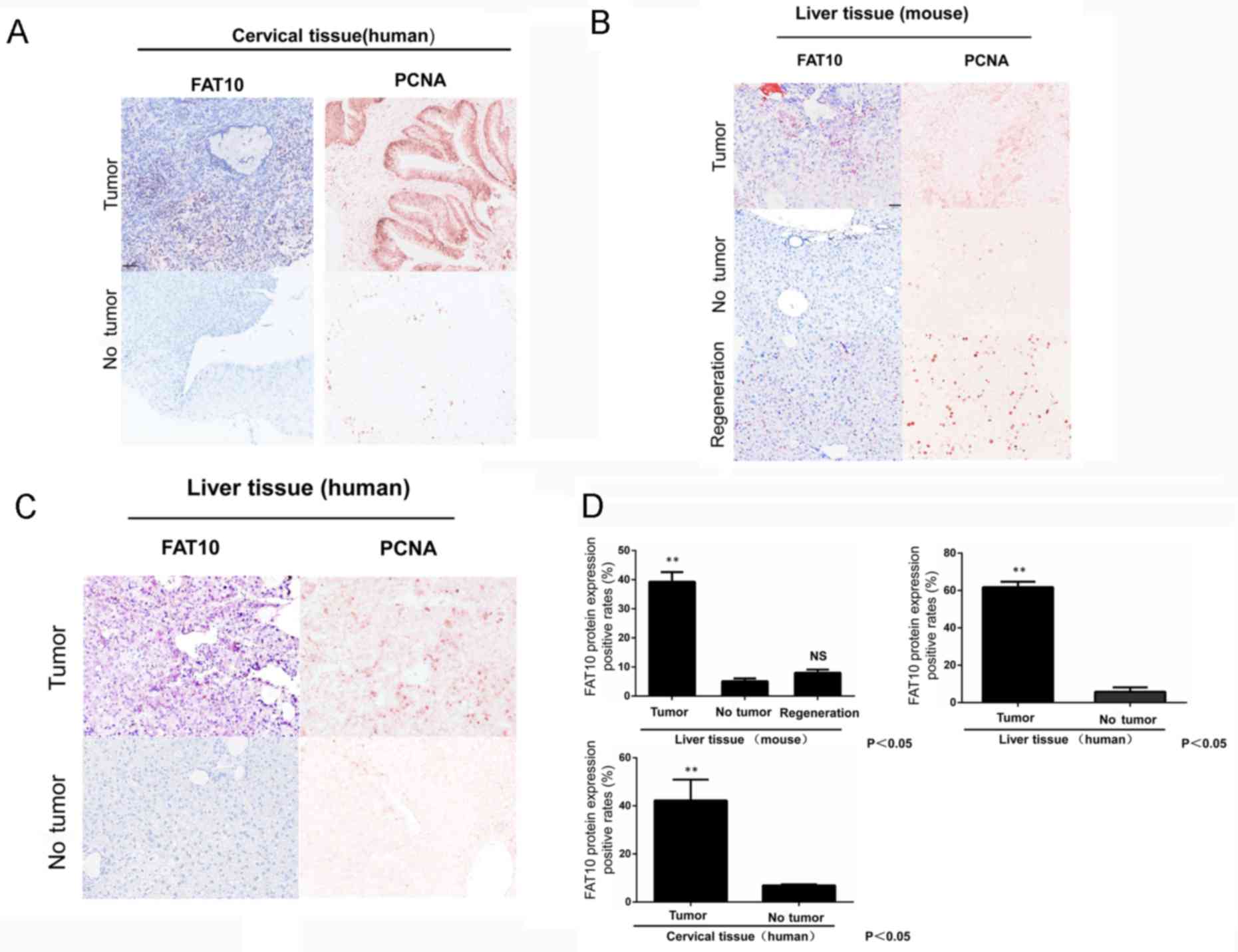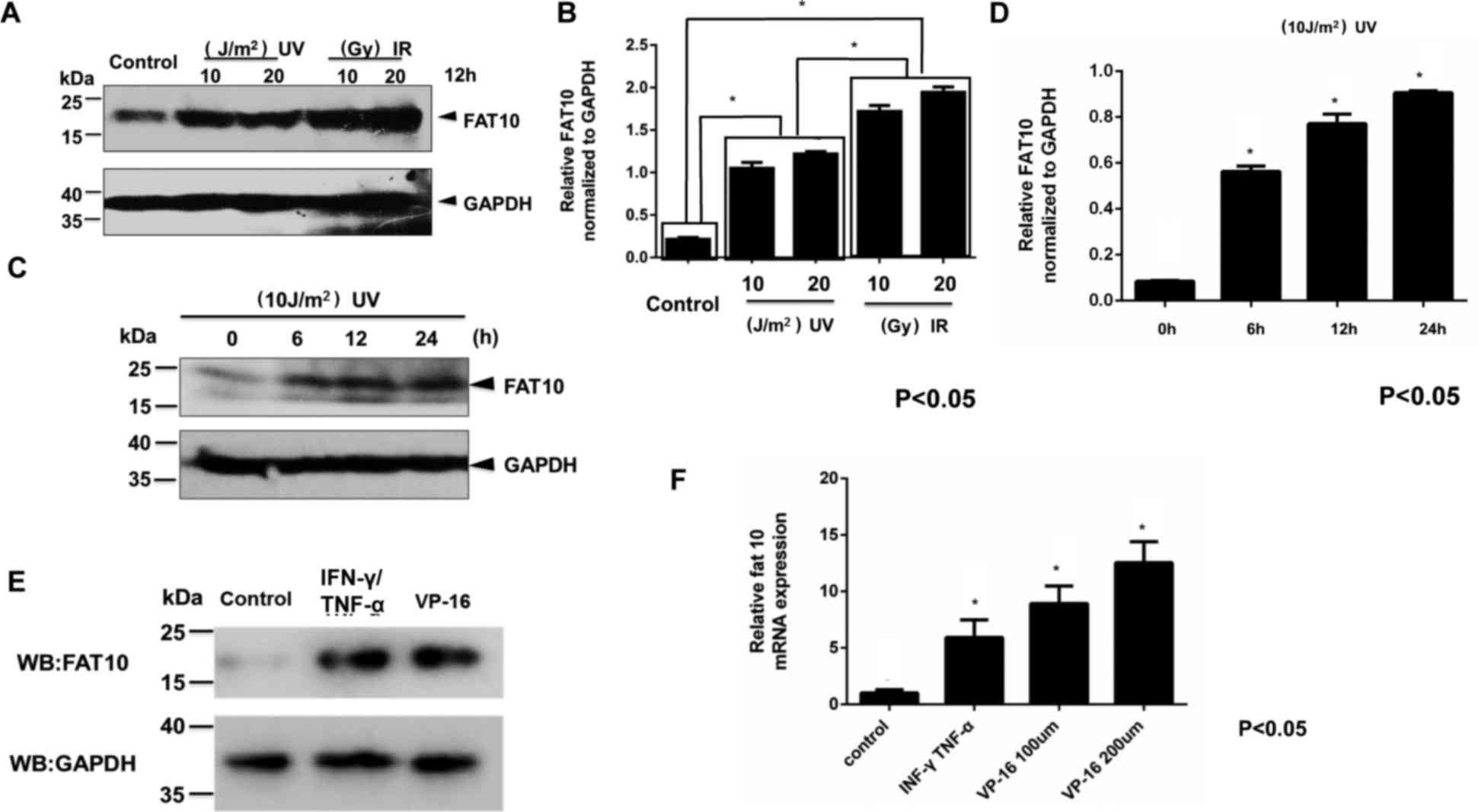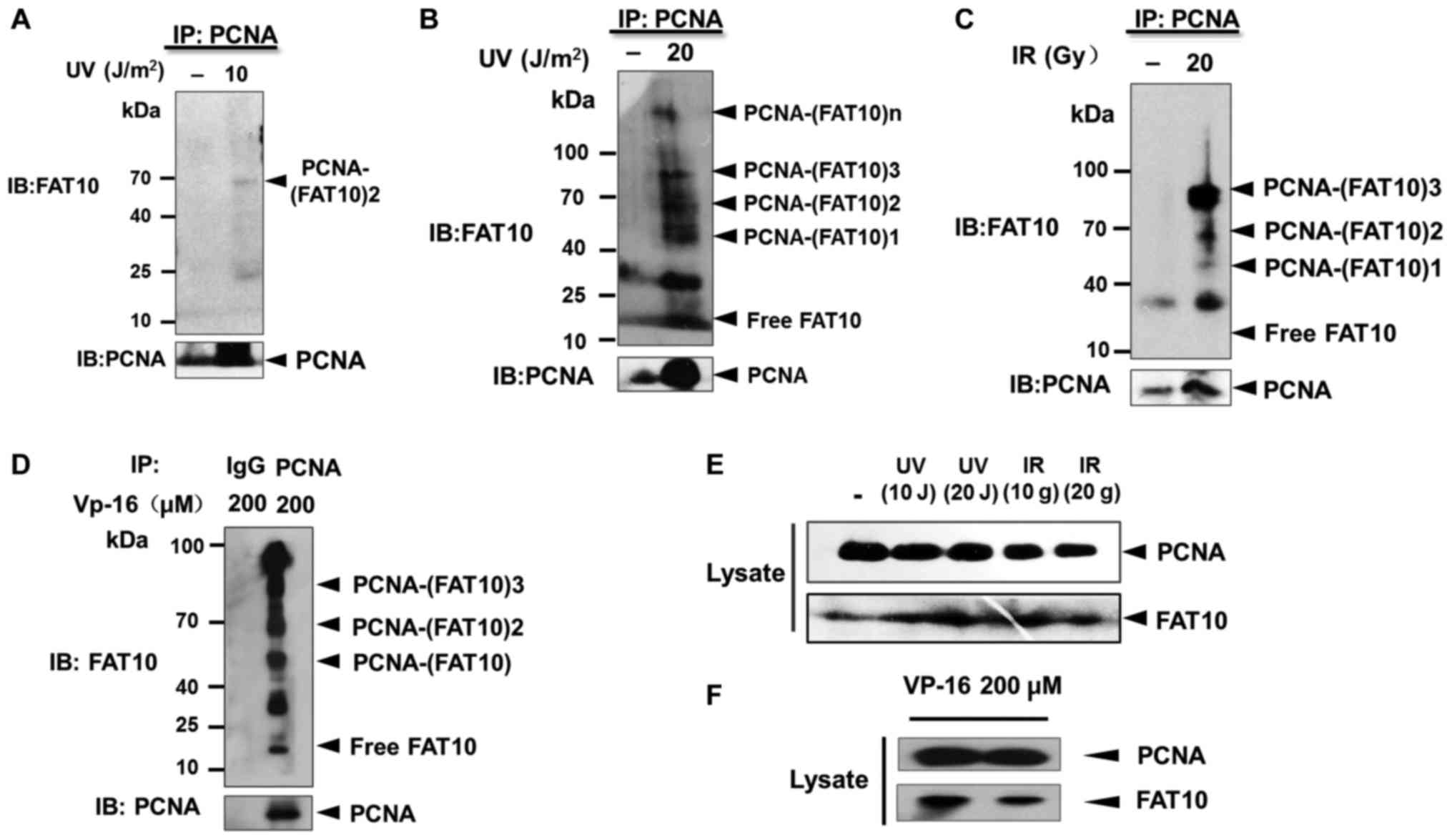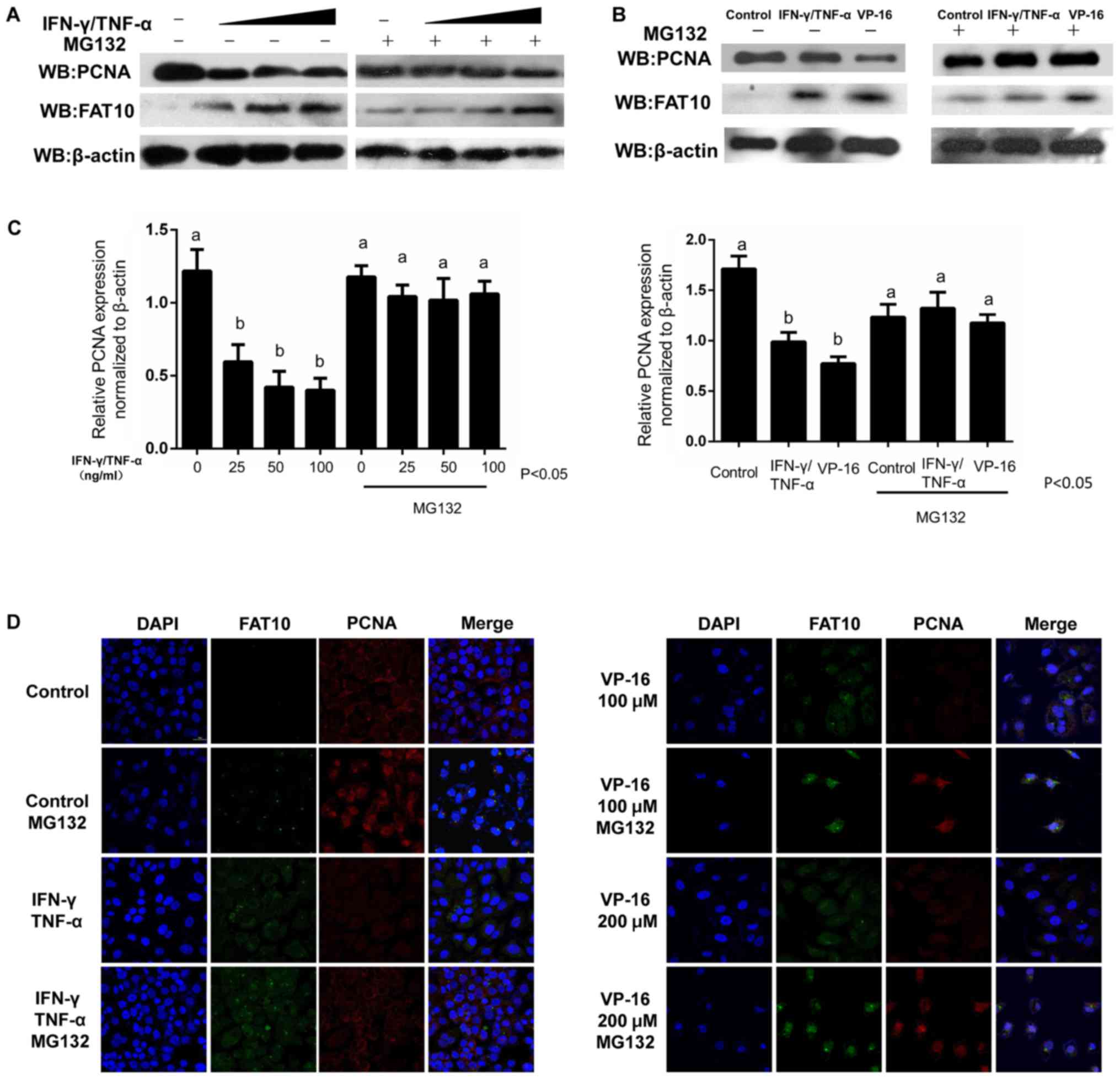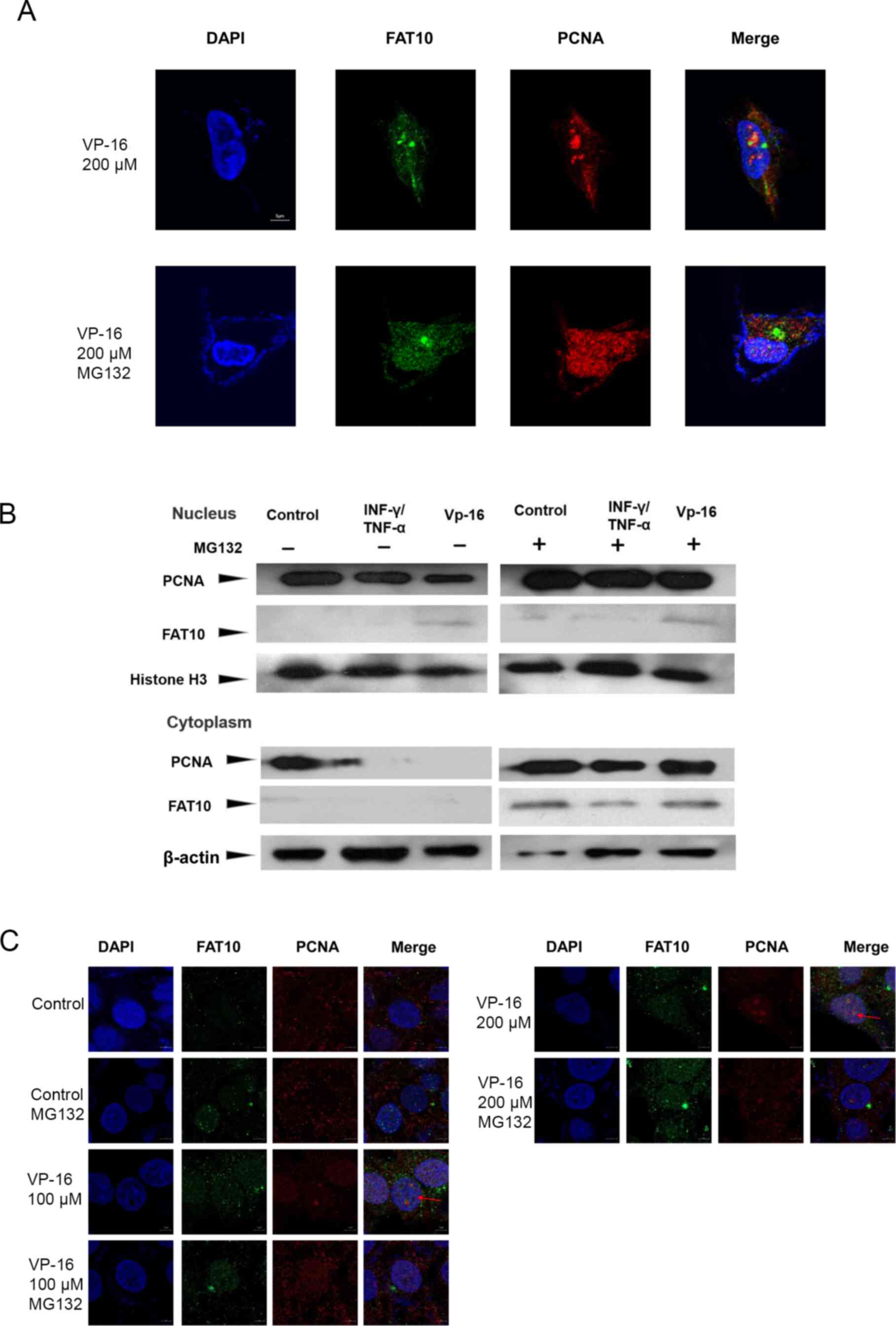|
1
|
Ren J, Kan A, Leong SH, Ooi LL, Jeang KT,
Chong SS, Kon OL and Lee CG: FAT10 plays a role in the regulation
of chromosomal stability. J Biol Chem. 281:11413–11421. 2006.
View Article : Google Scholar : PubMed/NCBI
|
|
2
|
Snyder A, Alsauskas Z, Gong P, Rosenstiel
PE, Klotman ME, Klotman PE and Ross MJ: FAT10: A novel mediator of
Vpr-induced apoptosis in human immunodeficiency virus-associated
nephropathy. J Virol. 83:11983–11988. 2009. View Article : Google Scholar : PubMed/NCBI
|
|
3
|
Terai K, Abbas T, Jazaeri AA and Dutta A:
CRL4(Cdt2) E3 ubiquitin ligase monoubiquitinates PCNA to promote
translesion DNA synthesis. Mol Cell. 37:143–149. 2010. View Article : Google Scholar : PubMed/NCBI
|
|
4
|
Hipp MS, Kalveram B, Raasi S, Groettrup M
and Schmidtke G: FAT10, a ubiquitin-independent signal for
proteasomal degradation. Mol Cell Biol. 25:3483–3491. 2005.
View Article : Google Scholar : PubMed/NCBI
|
|
5
|
Aichem A and Groettrup M: The
ubiquitin-like modifier FAT10 in cancer development. Int J Biochem
Cell Biol. 79:451–461. 2016. View Article : Google Scholar : PubMed/NCBI
|
|
6
|
Canaan A, Yu X, Booth CJ, Lian J, Lazar I,
Gamfi SL, Castille K, Kohya N, Nakayama Y, Liu YC, et al:
FAT10/diubiquitin-like protein-deficient mice exhibit minimal
phenotypic differences. Mol Cell Biol. 26:5180–5189. 2006.
View Article : Google Scholar : PubMed/NCBI
|
|
7
|
Canaan A, DeFuria J, Perelman E, Schultz
V, Seay M, Tuck D, Flavell RA, Snyder MP, Obin MS and Weissman SM:
Extended lifespan and reduced adiposity in mice lacking the FAT10
gene. Proc Natl Acad Sci USA. 111:5313–5318. 2014. View Article : Google Scholar : PubMed/NCBI
|
|
8
|
Lee CG, Ren J, Cheong IS, Ban KH, Ooi LL,
Tan Yong S, Kan A, Nuchprayoon I, Jin R, Lee KH, et al: Expression
of the FAT10 gene is highly upregulated in hepatocellular carcinoma
and other gastrointestinal and gynecological cancers. Oncogene.
22:2592–2603. 2003. View Article : Google Scholar : PubMed/NCBI
|
|
9
|
Zhang DW, Jeang KT and Lee CG: p53
negatively regulates the expression of FAT10, a gene upregulated in
various cancers. Oncogene. 25:2318–2327. 2006. View Article : Google Scholar : PubMed/NCBI
|
|
10
|
Leng L, Xu C, Wei C, Zhang J, Liu B, Ma J,
Li N, Qin W, Zhang W, Zhang C, et al: A proteomics strategy for the
identification of FAT10-modified sites by mass spectrometry. J
Proteome Res. 13:268–276. 2014. View Article : Google Scholar : PubMed/NCBI
|
|
11
|
Moldovan GL, Pfander B and Jentsch S:
PCNA, the maestro of the replication fork. Cell. 129:665–679. 2007.
View Article : Google Scholar : PubMed/NCBI
|
|
12
|
Kannouche PL, Wing J and Lehmann AR:
Interaction of human DNA polymerase eta with monoubiquitinated
PCNA: A possible mechanism for the polymerase switch in response to
DNA damage. Mol Cell. 14:491–500. 2004. View Article : Google Scholar : PubMed/NCBI
|
|
13
|
de Medina-Redondo M and Meraldi P: The
spindle assembly checkpoint: Clock or domino? Results Probl Cell
Differ. 53:75–91. 2011. View Article : Google Scholar : PubMed/NCBI
|
|
14
|
Lindahl T and Barnes DE: Repair of
endogenous DNA damage. Cold Spring Harb Symp Quant Biol.
65:127–133. 2000. View Article : Google Scholar : PubMed/NCBI
|
|
15
|
Mailand N, Gibbs-Seymour I and
Bekker-Jensen S: Regulation of PCNA-protein interactions for genome
stability. Nat Rev Mol Cell Biol. 14:269–282. 2013. View Article : Google Scholar : PubMed/NCBI
|
|
16
|
Brown JS and Jackson SP: Ubiquitylation,
neddylation and the DNA damage response. Open Biol. 5:1500182015.
View Article : Google Scholar : PubMed/NCBI
|
|
17
|
Gibbs-Seymour I, Oka Y, Rajendra E,
Weinert BT, Passmore LA, Patel KJ, Olsen JV, Choudhary C,
Bekker-Jensen S and Mailand N: Ubiquitin-SUMO circuitry controls
activated fanconi anemia ID complex dosage in response to DNA
damage. Mol Cell. 57:150–164. 2015. View Article : Google Scholar : PubMed/NCBI
|
|
18
|
Park JM, Yang SW, Yu KR, Ka SH, Lee SW,
Seol JH, Jeon YJ and Chung CH: Modification of PCNA by ISG15 plays
a crucial role in termination of error-prone translesion DNA
synthesis. Mol Cell. 54:626–638. 2014. View Article : Google Scholar : PubMed/NCBI
|
|
19
|
He M, Zhou W, Li C and Guo M: MicroRNAs,
DNA Damage Response, and Cancer Treatment. Int J Mol Sci. 17:pii:
E2087. 2016. View Article : Google Scholar
|
|
20
|
Tian H, Gao Z, Li H, Zhang B, Wang G,
Zhang Q, Pei D and Zheng J: DNA damage response-a double-edged
sword in cancer prevention and cancer therapy. Cancer Lett.
358:8–16. 2015. View Article : Google Scholar : PubMed/NCBI
|
|
21
|
Hershko A, Ciechanover A and Varshavsky A:
Basic Medical Research Award. The ubiquitin system. Nat Med.
6:1073–1081. 2000. View
Article : Google Scholar : PubMed/NCBI
|
|
22
|
Hoege C, Pfander B, Moldovan GL,
Pyrowolakis G and Jentsch S: RAD6-dependent DNA repair is linked to
modification of PCNA by ubiquitin and SUMO. Nature. 419:135–141.
2002. View Article : Google Scholar : PubMed/NCBI
|
|
23
|
Bienko M, Green CM, Crosetto N, Rudolf F,
Zapart G, Coull B, Kannouche P, Wider G, Peter M, Lehmann AR, et
al: Ubiquitin-binding domains in Y-family polymerases regulate
translesion synthesis. Science. 310:1821–1824. 2005. View Article : Google Scholar : PubMed/NCBI
|
|
24
|
Mukhopadhyay D and Riezman H:
Proteasome-independent functions of ubiquitin in endocytosis and
signaling. Science. 315:201–205. 2007. View Article : Google Scholar : PubMed/NCBI
|
|
25
|
Livak KJ and Schmittgen TD: Analysis of
relative gene expression data using real-time quantitative PCR and
the 2(-Delta Delta C(T)) method. Methods. 25:402–408. 2001.
View Article : Google Scholar : PubMed/NCBI
|
|
26
|
Lanton T, Shriki A, Nechemia-Arbely Y, et
al: IL6-dependent genomic instability heralds accelerated
carcinogenesis following liver regeneration on a background of
chronic hepatitis. Hepatology. 2016.
|
|
27
|
Buchsbaum S, Bercovich B and Ciechanover
A: FAT10 is a proteasomal degradation signal that is itself
regulated by ubiquitination. Mol Biol Cell. 23:225–232. 2012.
View Article : Google Scholar : PubMed/NCBI
|
|
28
|
Aichem A, Kalveram B, Spinnenhirn V, Kluge
K, Catone N, Johansen T and Groettrup M: The proteomic analysis of
endogenous FAT10 substrates identifies p62/SQSTM1 as a substrate of
FAT10ylation. J Cell Sci. 125:4576–4585. 2012. View Article : Google Scholar : PubMed/NCBI
|
|
29
|
Lim CB, Zhang D and Lee CG: FAT10, a gene
up-regulated in various cancers, is cell-cycle regulated. Cell Div.
1:202006. View Article : Google Scholar : PubMed/NCBI
|
|
30
|
Schmidtke G, Kalveram B and Groettrup M:
Degradation of FAT10 by the 26S proteasome is independent of
ubiquitylation but relies on NUB1L. FEBS Lett. 583:591–594. 2009.
View Article : Google Scholar : PubMed/NCBI
|















